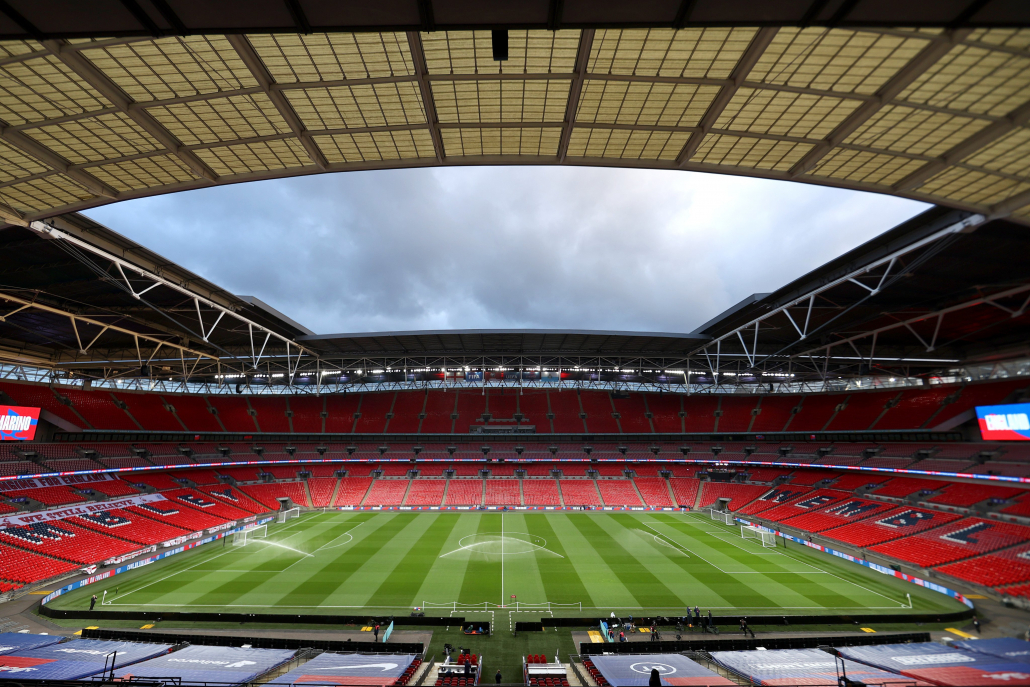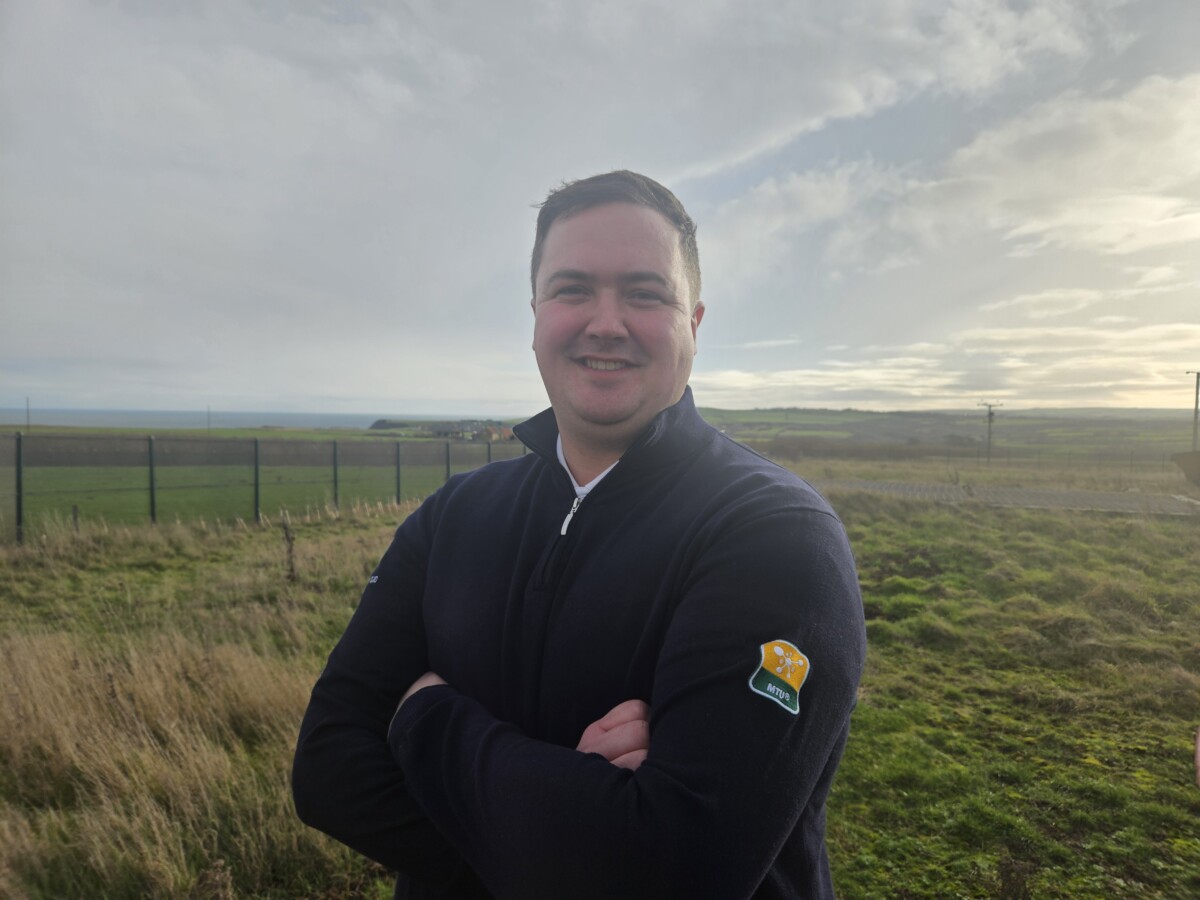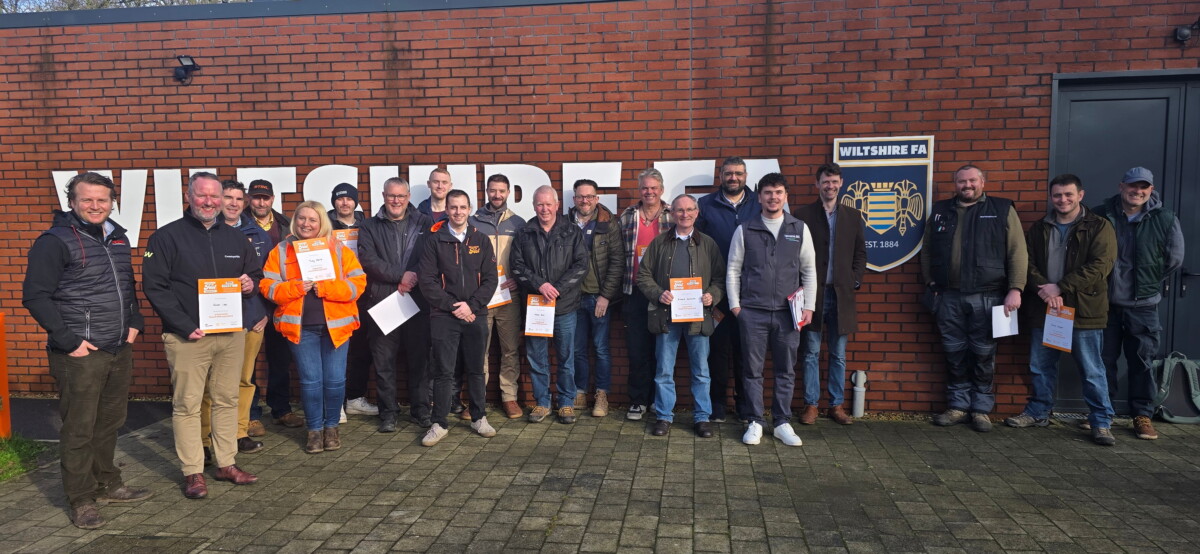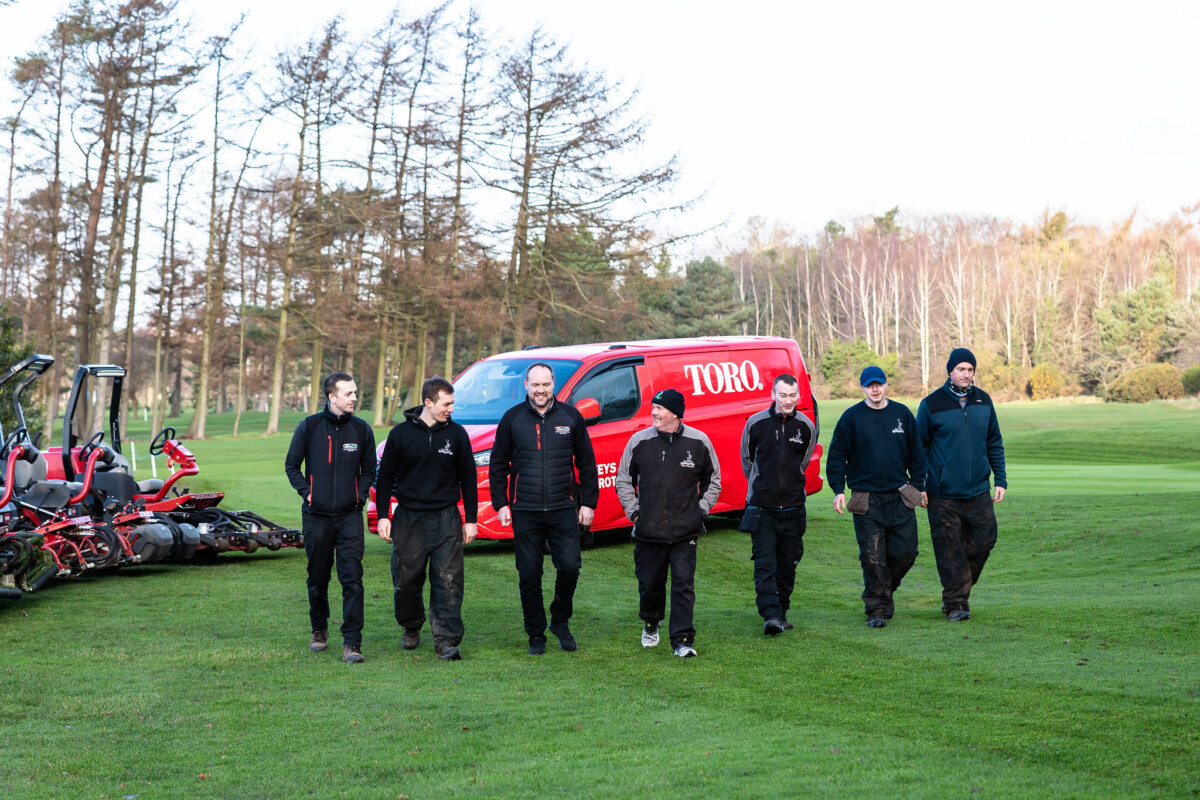Turf management is coming home: Scott MacCallum chats with Karl Standley and Andy Gray about their respective roles and the forthcoming European Championship.
We can all remember our first day at work. Mine? The train was late, I missed my connection and I had to hitchhike from Dundee to Perth, thus clocking into my first day of honest endeavour two and a half hours late, not fit for even the most basic of induction.

Turf management is coming home
What a first impression! Imagine then, this fresh faced young lad cycling 15 miles, then hopping onto a train, all to get to his local club’s training ground to his first job in groundsmanship.
He’s teamed up with a senior team member, whose job is to guide him through his first day, and is handed the task, under supervision of course, of seeding four pitches and a goalkeeping area.
Up and down he goes, concentrating hard on producing the straightest lines he can muster. Heaving a great sign of relief, mission accomplished, he glanced back to see that the seeder hadn’t been turned on!
His mentor just said, “Do it again”, and a first lesson had been delivered.
But from such inauspicious beginnings great careers can be salvaged, and I’m not talking about mine.
Eighteen years on, that callow youth is preparing the most famous football pitch in the world for the country’s biggest football event since football came home in 1996 – the delayed Euro 2020s. Still a young man, Karl Standley, is Head Groundsman at Wembley Stadium, and that first job was at Southampton Football Club.
And mentor? The guy who let Karl carry on, knowing that the longer he went without realising the seeder was inactive, the better the lesson would be? Well, Andy Gray became Head of Grounds at the FA’s St George’s Park last September, and is now working hand in glove with Karl, and with the England team management, to ensure training conditions conducive to aiding England’s assault on the Championships.
The odds on Karl and Andy going on to hold two of the most prestigious jobs in world groundsmanship would have been so high, that if, during their break on that very first day, they’d popped down to the bookies and put tenner them both reaching where they are now, they could be retired rather than facing up to the most exciting few weeks of their careers.
Ah, the Euros. Well, this time last year Karl was working on a number of scenarios based on the impact of Covid 19, on the assumption that they would still be going ahead on the expected dates. It would be fair to suggest that what ultimately has happened with the impact of the pandemic would not have been covered by any FA scenario, or anyone else’s for that matter.
Andy, on the other hand, started last year planning maintenance programmes for Southampton before the FA came calling and he started work on September 1, last year.
“When we heard those words from Boris Johnson about the seriousness of the pandemic and the lockdown we put everything on hold, but as we all know Mother Nature doesn’t have an ‘Out of Office’ and the grass keeps growing,” recalled Karl.
“So, for us, it was a case of putting a protective bubble around the team and carrying on the good work. Our main focus was on making sure our team was safe, making sure they were healthy, making sure we were aware of any issues in their home life that we should be aware of and that they knew they had our support.”
Like everyone else at the time, Karl’s crystal ball was in need of a complete reboot and wasn’t providing any hints to help his path forward, but he and the team were able to do what they could to keep on top of things.
“Looking ahead to what the next few months were to hold was difficult as no-one knew whether the lockdown was going to be one month, two months or three. Everybody was wanting to know when football was going to come back. It was the one question they were asking.
“But, at the stadium, we just wanted to keep the pitch as healthy as possible so that we were ready for when football did come back.
That was our plan,” explained Karl.

Turf management is coming home
“Luckily our roles are primarily outdoors in the fresh air and we were able to put protocols in place for when we were in the building.
It was a difficult situation to manage but everyone bought into the mindset of keeping everyone safe. The key, as always, is good communication,” explained Karl, who worked two days a week from home during the lockdown, swapping with other members of the team, to ensure minimal numbers were working on site at any one time.
Much of their work was put on hold but as Karl readily admits, “It’s hard for grounds teams to stop and sit still”, and they were still constantly out on the pitch refining what they do.
“We were regularly raking and regularly verti-cutting, constantly on the pitch trying to thin the plant out, make it work and keep it healthy. It was a case of how quickly can we do four rakes of the playing surface and how quickly can we recover.
We ran a few scenarios during lockdown so we could collect data and analyse the results we were getting from the pitch so that we would be ready for when football came back and for the Euros too.”
While Karl was grappling with the consequences of Covid and lockdown at Wembley, Andy was dealing with similar issues at Southampton where he was Grounds Manager.
“When it all stopped nobody had a clue what was going on. I remember that Premier League football was suspended for two weeks and our next match on April 4th was called off and then it went further into April and then further after that. We eventually got going again mid to late June, but it was tricky for us to know what we could and should do in terms of pitches and training ground.
“If we’d known on March 23rd that we had until June 23rd we’d have ripped all the pitches up and renovated them there and then,” said Andy, speaking from his new place of work 135 miles north of Wembley.
When play did start and one season quickly merged into the next, it didn’t give much time for the regular close season renovation work and while Andy believes that pitches have suffered as a result, he can see a small upside to the situation.
“We are often told we are mad to be tearing up a perfectly good pitch, but what has happened this year shows the importance of the work we do between seasons. This season has proven why we do what we do.”
Andy took up post at St George’s Park on September 1, but there was no gentle introduction to his new job as, on that very same day, the England squad arrived to prepare for their autumn internationals.
“I actually started when arguably the pandemic was at its least severe bur come November, lockdown two, the tier system and then lockdown three in January, it’s been pretty tough. But I’ve always said there are plenty of people worse off then me. I’m very lucky to have what I’ve got and to be doing the job that I do,” said Andy, who is living in rented accommodation in Burton and travelling back to his family in Southampton when work allows.
Asked if the situation has been tricky for him Andy is quick to come up with another word entirely -“exciting”.
“It’s the FA, it’s England and it’s what I really wanted to do,” he said.
Andy will have around nine months to prepare St George’s Park for the Euros with the state-of-the-art facility acting as the nerve centre for Gareth Southgate’s campaign to win a second major title.
“It has been a learning curve since I joined. I’d been at Southampton for 22 years and of the 350 or so employees I was the third longest serving, so I’ve gone from everyone knowing that I was there to being the new person. I’ve never experienced that before,” he explained.
However, the pandemic has provided Andy with time which he has used wisely.

Turf management is coming home
“With nobody around for long periods of time it has allowed me to get to know the site and appreciate where things are, it’s just that there are people who I haven’t met yet in the flesh. We have video calls but it’s not the same.”
I asked if Andy had a pre-determined plan to work within at St George’s, if he had the opportunity to put his own stamp on things.
“On the whole I’ve got a free hand to do what I want to do. It was a strange situation in that there was nine months between my predecessor Scott (Brooks) leaving and me taking over. The team here ran things until I started. That, together with the pandemic, meant that there was no official handover.
“But I Iike to think that I got the job on the back of the work I’d done at Southampton, not just on the pitch, but staff-wise and business-wise too.
So that is what I’m looking to impose here. Why change what I was doing when it was successful in the first place?”
Back at Wembley and Karl is having to prepare for the Euros while taking on board all the re-scheduled matches from last year, the matches which offer all levels of player the unique honour of playing on the hallowed Wembley turf.
“We’ve got seven*matches at the Euro’s including both semi finals and the final. We’ve also got five training sessions and probably about seven or eight closing ceremony rehearsals, plus the ceremony itself. But we’ve just had a busy month with backlog from last season to catch up on.
“While just two weeks ago we had the Papa John’s Trophy, Portsmouth against Salford, and that had been held over from 2020, while we have the FA Vase and the FA Trophy as a double header on the same day. There is also the FA Cup semis and the final itself, and the Carabao Cup final.
But the famous pitch is prepared to the highest standard irrespective of whether it is Sutton United playing Harrogate Town or England playing Scotland in the final of the Euros.
“It is all done the same. When we are classed as a neutral venue we prepare the pitch so that it will play best and, for me, that’s a quick game of football. That’s what we like to see, that’s what brings the entertainment and that’s what the players are practising at their training venues. So, whether it is the FA Vase or the FA Cup final itself it is always the same.”
Ensuring the pitch is at its best is a team effort and Karl is blessed with an experienced group of lads, all of whom have an input into how the highest possible standards are met, with cultural methods to the forefront.
“On the back of a game we’ll tear the pitch to pieces and just get the grass plant working and keeping it as healthy as well. Cultural over chemical, that’s our philosophy,” explained Karl, who shares Andy’s view that the best pitch is a “short pitch and a wet pitch”.
“It also about data checking to ensure that the rotational resistance is there. We also look at textile strength. It is key to me when the first bit of sunshine touches the first blade of grass in March that we know we are charging that pitch up and that we have that textile strength.
Without the data it’s a guessing game. Everyone can have an opinion but I’m always looking at the key data to make sure we are ready.”
Back at St George’s and Andy is gearing up for a big month and having just had both the full and under 21 national teams on site is becoming more familiar with the England staff.
“When I arrived at the same time as the squad last September that first camp just flew by but this last week, having both squads here meant I got to know more people and recognising backroom staff on TV from their time here meant I really felt a part of it.
“So, for June we are treating St George’s Park as a club training ground for, hopefully, five or six weeks and within that we’ll have daily dialogue with either Gareth, or his assistant Steve Holland. The medical team play a huge part as well, while I’ll also be speaking with Karl as well because we will be wanting to produce the same conditions to train on as they will have to play on,” he explained.
“It is a real honour to be a part of it. Like anyone who follows football, as a kid I watched Italia ‘90, Euro ‘96, France ‘98 and there was a real buzz about the country. That was one of the things which attracted me to the role in the first place.
“Last week I was able to stand at the side of the pitch watching them train for 20 minutes and I really appreciated what a proper privilege it was.”
Andy visited Karl at Wembley not long after he started but the chat by Teams’ phone on a regular basis covering topics as wide ranging as football pitches; vintage football shirts; family and Panini stickers as both Karl and Andy were and still are avid collectors.
It isn’t surprising though given that shared history they have going right back to the Southampton training base in 2003, and that first meeting on a noisy SISIS Hydromain. Karl was an avid Saints fan and season ticket holder and was one of the ecstatic crowd when Matt Le Tissier scored the very last goal at the Dell, before the club moved to St Mary’s.
“We do go back a long way and have shared trips abroad and went to each other’s wedding. So, it is more than just work for us,” revealed Andy.
So what is it about Southampton which has produced, not just Karl and Andy, but also Dave Roberts, now Head of Grounds at Liverpool; Graeme Mills, current Southampton Head Groundsman; Ricky Rawlings and Dan Osbourne.
“For the first nine years of my career I worked under Dave Roberts and I’ve said it before, and I’ll say it forever, I could not have asked for a better mentor, tutor, teacher for those early years. That was where my start came from.
“Southampton isn’t just a great academy for players. It’s a great academy for ground staff as well.”
And while Karl wasn’t at Southampton for as long as Andy, he is also quick to credit Dave Roberts for the wonderful start he gave him to his career.

Turf management is coming home
“He was my first real manager and I really soaked it all in. Dave is calm, cool headed and believes in his team. He was always open with me and that mind set is one thing I’ve taken into my grounds team here at Wembley,” said Karl, of his former boss.
So, when that Euro 2020 trophy is held aloft by Harry Kane, or could it be Andy Robertson, at around 10pm on Sunday July 11, or 10.30, if Scotland have had to rely on penalties again, two men – and another sitting watching on TV in Liverpool – will be thinking back to that first meeting on the rusty old Hydromain on the Southampton training ground and appreciating, in Karl’s case, that it is not how you start it’s how you finish.
See Karl and Andy talk with Scott MacCallum on the Turf Matters YouTube channel


























